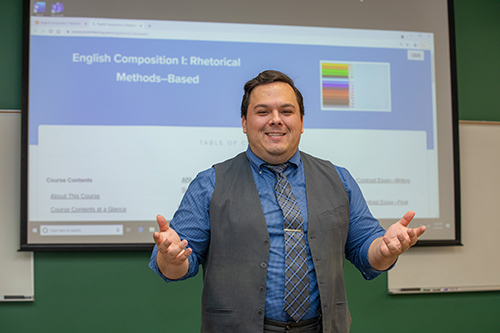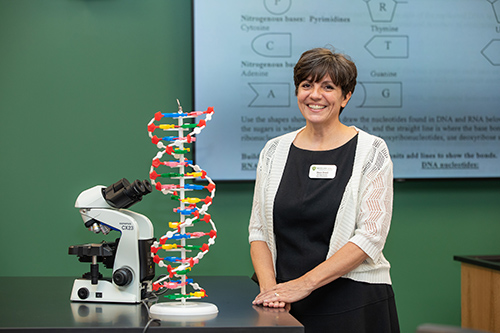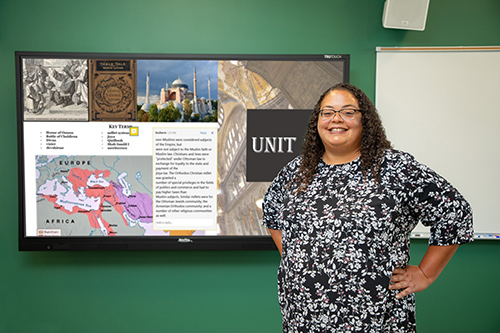Motlow Saves Students Money with OER
August 16, 2021
While many educational institutions grapple with providing quality instruction, Motlow State Community College is working to reduce the cost of getting an education. A recent Treasury Department report noted that Motlow State was recognized as a leader in controlling the cost of college attendance. One of the ways the College is meeting this goal is by reducing the costs of materials for students.
 "Textbook costs can get out of hand very quickly. Financial aid often won't cover
the cost of textbooks for students," said Tom Cruz, English instructor and Languages
Department curriculum chair at Motlow. "In eliminating that barrier, it creates a
more open field for students who might normally be priced out of attending college."
"Textbook costs can get out of hand very quickly. Financial aid often won't cover
the cost of textbooks for students," said Tom Cruz, English instructor and Languages
Department curriculum chair at Motlow. "In eliminating that barrier, it creates a
more open field for students who might normally be priced out of attending college."
As part of Motlow's 2020-21 Annual Plan for Improvement, 16 general education courses were initially established as Open Education Resources (OER) at the start of the Fall 2020 semester. These types of resources can strengthen a student's educational experience.
“The high costs of textbooks are forcing students to make decisions that compromise their academic success,” said Dr. Robert Denn, associate vice chancellor of the Tennessee Board of Regents (TBR). “The College System of Tennessee has provided significant, state-level funding and thought leadership and innovation in the area of OER, which is firmly rooted in our strategic plan.”
TBR collaborated with the Tennessee Higher Education Commission (THEC) to launch Tennessee Open Education, a statewide effort to advance the use of OER. Some component parts and related programmatic activities include: the TN Open Education Hub, OER Grant Program (Access & Diversity), and OER Advocacy Teams.
 "Textbooks and supplementary materials can be costly, and students may not be able
to afford these items. Some students attempt to complete a course without purchasing
the materials, which leads to poor performance and reduced learning," said Stacy Dowd,
assistant professor and Natural Science Department curriculum chair at Motlow.
"Textbooks and supplementary materials can be costly, and students may not be able
to afford these items. Some students attempt to complete a course without purchasing
the materials, which leads to poor performance and reduced learning," said Stacy Dowd,
assistant professor and Natural Science Department curriculum chair at Motlow.
Tennessee students enrolled in public institutions spent an average of $1,400 on course materials in the 2018-2019 academic year, and in fall 2019, the average cost of materials for community college students was $119.18 per course.
“We estimate that students will save just over $1.1 million during the upcoming school year by using open education resources developed from the first round of grant funding we have issued,” said Denn.
THEC convened the Tennessee Textbook Affordability Task Force in Spring 2020 to increase equity of opportunity by decreasing textbook costs for students through strategic use of technology and partnerships. However, Motlow began developing OER courses prior to 2020.
Several Motlow instructors received training on the development and adoption of OER content from the Director of Online Learning for Central State University, Dr. Arletha McSwain, in 2019. She has extensive, successful experience in project management to include launching nationally certified online degree programs. Additionally, she is the 2017 recipient of the United States Distance Learning Association Hall of Fame Award.
“Education is changing. Motlow President, Dr. Michael Torrence, and the leadership team at the College are champions for keeping college affordable, accessible, and equitable,” said McSwain. “By the time a textbook is published and placed on the shelf, the content could be a couple of years old. OER prepares our students to be competitive with current information that is live and state of the art.”
While OER resources can help control costs and keep students competitive, they also help keep colleges nimble.
“Institutions that hadn’t completed OER struggled during the pandemic. Motlow was able to have a much smoother transition,” added McSwain.
Motlow developed OER materials for select courses. These materials are used as student learning resources instead of textbooks and they are available to the students at no charge. Students have a reduced cost for taking a course. The College has developed more than 50 OER courses over the past year, including history, biology, communication, English, math, music, sociology, and many more.
McSwain noted that “Students may have to choose between putting gas in their car or buying a meal instead of purchasing an expensive textbook. Thanks to OER courses, students can come to Motlow without having to worry about purchasing expensive books.”
"If we can help a student afford just one class and they succeed in that course, then they can aspire to do more,” added Dowd. “Success in one course can increase a student's self-confidence and can lead to increased retention and successful completion of a degree."
Simply put, OER eliminates the cost of expensive textbooks. The materials used for teaching or learning are either in the public domain or released under a license that allows them to be freely used, changed, or shared with others.
 "These resources are student-focused in cost and content, created by educators to
facilitate learning at the college level. In many ways, OER is a way of crowdsourcing
learning materials from scholars, as well as students, to develop quality, flexible,
and affordable educational resources for the 21st-century learning environment," said
Dr. Monica Butler, assistant professor of history at Motlow. "OER courses use several
methods of quality management to ensure content is accurate and up to modern standards
within a field of study."
"These resources are student-focused in cost and content, created by educators to
facilitate learning at the college level. In many ways, OER is a way of crowdsourcing
learning materials from scholars, as well as students, to develop quality, flexible,
and affordable educational resources for the 21st-century learning environment," said
Dr. Monica Butler, assistant professor of history at Motlow. "OER courses use several
methods of quality management to ensure content is accurate and up to modern standards
within a field of study."
Offering courses with OER does not come without challenges. Therefore, it is not a one-size-fits-all option for every class.
"The challenges for me have not been in the teaching of the course, but in finding materials. The OER resources available are expanding daily, but it is still a process to locate quality resources that match the outcomes of the course," explained Dowd. "Each course is different, and the use of OER is a decision to be made course-by-course. They are not the best solution in all situations."
"I'm a huge fan of OER texts. They do present new challenges to instructors and probably won't work in every course or every discipline, but they make a huge difference in opening up higher education to those that feel priced out of it," said Cruz.
However, the benefits outweigh the current challenges.
"I think OER courses can help bridge the financial gaps that students may encounter when it comes to access to resources," Dowd said.
"One notable early success Motlow observed in implementing OER is History," said Motlow's Assistant Vice President for Academic Affairs Dr. Melody Edmonds. "The change to fully OER in all Fall 2020 History classes resulted in a four percent increase of the student success rates from Pell-eligible students comparing the fiscal year 2019 to the fiscal year 2020."
While developing free educational resources, Motlow had to consider all of the skill development and content competencies a student must master in order to demonstrate specific learning outcomes.
"Faculty have been recording hours of lectures and editing open-source textbook materials to adapt these courses to the unique needs of Motlow students. Student feedback has been valuable to this process and drives our efforts to enhance student achievement," said Butler. "Most importantly, these resources support Universal Design of Learning by offering course content that is accessible and relevant for the diverse needs of students."
The College encourages students to learn more about courses using OER. Those courses are listed in the class schedule as “Zero Cost for Textbook.”
All of the OER materials developed by the TBR grant teams will be housed in the TN Open Education Hub. The repository leverages the work of faculty and staff across the state and making resources available to professors and their students around the world.
Motlow State fall classes begin August 23. Apply today to Motlow.com/apply. For more information regarding reduced costs for students, email [email protected] or call 800-654-4877.
Tennessee’s Community Colleges is a system of 13 colleges offering a high-quality, affordable, convenient, and personal education to prepare students to achieve their educational and career goals in two years or less. The system offers associate degree and certificate programs, workforce development programs, and transfer pathways to four-year degrees. For more information, please visit us online at tbr.edu or visit Motlow at mscc.edu.
